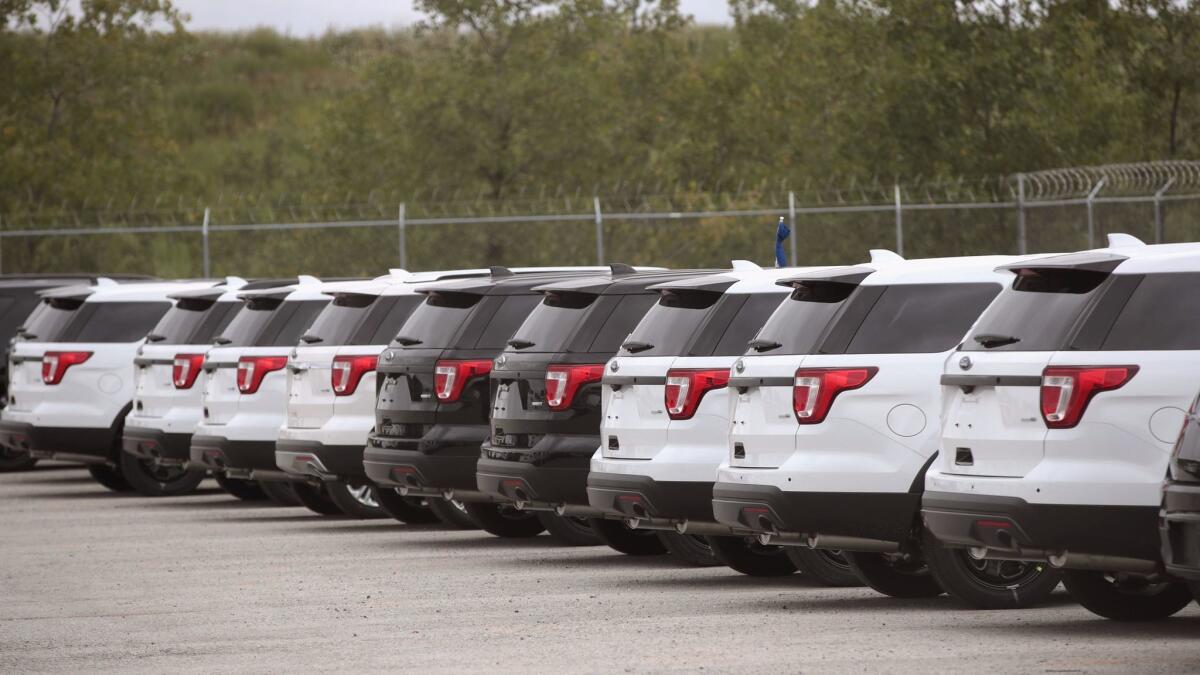Concern mounts about exhaust odors, carbon monoxide in police Ford Explorers

- Share via
Ford Motor Co. and federal regulators are investigating concerns raised by police departments around the country about excessive carbon-monoxide levels and exhaust odors in their police Ford Explorers, causing officers to fall ill.
The Police Department in Austin, Texas, said it pulled nearly 400 Ford Explorers from its fleet after finding that 20 officers tested positive for elevated levels of carbon monoxide, including one who briefly blacked out behind the steering wheel.
And in Auburn, Mass., the Police Department said three of its officers had been sent to the hospital for “high carbon-monoxide levels” and that one officer was in a minor crash as a result.
Ford said the problem might involve police-related alterations made to the vehicles after they leave the assembly plant, which can leave holes and unsealed spaces. Modifications to police cars can be made in-house or by third-party vendors.
The automaker said it does not believe the problem extends to non-police versions of the popular sport utility vehicle. In the U.S. last year, Ford sold 216,294 Explorers and 32,213 versions modified for police use, known as Police Interceptor Utility vehicles. Together, they accounted for 9.5% of the company’s total U.S. sales.
“Drivers of regular, non-police Ford Explorers have no reason to be concerned,” Ford said. “We have not found elevated levels of carbon monoxide in non-police Ford Explorers.”
But the National Highway Traffic Safety Administration said the complaints have extended to regular consumers. The agency said it had received reports of three crashes and symptoms such as loss of consciousness, nausea, headaches or lightheadedness.
The agency said it was probing the matter on model year 2011-2017 Ford Explorers — both police and non-police versions — “to determine if this issue is related to a potential safety defect.”
NHTSA said the problem with the police version might be cracks in the exhaust manifold that “may explain the exhaust odor.” The manifold collects exhaust gas from the engine and delivers it to the exhaust pipe.
But the agency said that so far, “no substantive data or actual evidence ... has been obtained supporting a claim that any of the alleged injury or crash allegations were the result of carbon-monoxide poisoning, the alleged hazard.”
Ford said it would investigate all the reports, “including the exhaust-manifold issue” cited by NHTSA.
Ford also said it would pay the costs of repairs “in every Police Interceptor Utility that may have carbon-monoxide concerns, regardless of modifications made after leaving Ford’s factory.”
The automaker noted that when a police department installs emergency lighting, radios and other equipment, “they have to drill wiring-access holes into the rear of the vehicle. If the holes are not properly sealed, it creates an opening where exhaust could enter the cabin.”
There are about 126,000 Police Interceptor Utility vehicles used throughout U.S. law enforcement, including the Los Angeles Police Department and the California Highway Patrol.
No LAPD officers have reported carbon-monoxide issues and none of the department’s fleet of 1,003 Explorers has experienced toxic gases leaking into the vehicles’ cabins through holes in the trunk, said Vartan Yegiyan, assistant commanding officer of the LAPD’s Administrative Services Bureau.
The department did have about 60 to 65 Explorers that required replacement of the exhaust manifolds, although the issue did not result in fumes in the vehicles’ cabins, he said.
The cars have all been repaired and returned to service with assistance from Ford engineers, Yegiyan said.
The CHP, with 1,700 Explorers in its fleet, said that “occasionally complaints arise” and that the CHP “addresses them on a case-by-case basis.” But the CHP said it had not installed so-called CO meters, which measure carbon-monoxide levels in the air, on its standard patrol vehicles.
Police in Manchester, N.H., and some departments in Rhode Island and Massachusetts have installed CO meters in their patrol Explorers until the issue is resolved.
“We would urge other departments to have their cruisers tested and/or purchase detectors to ensure everyone’s safety,” Auburn police said on Facebook.
The Explorer and other SUVs continue to be a bright spot in what has otherwise been a tough sales year for Ford. Explorer sales in July totaled 18,763, up 12.9% from the same month last year. The figures do not include police fleet sales.
Ford said that if any driver of an Explorer notices an exhaust odor, customers should take it to a Ford dealer or call 888-260-5575.
NHTSA also said any Explorer owner concerned about a safety issue can call 888-327-4236 or submit a complaint at NHTSA.gov.
The Associated Press was used in compiling this report.
Twitter: @PeltzLATimes
ALSO
Volkswagen executive pleads guilty in emissions scandal
Ferrari GTC4 Lusso: Lush looks and luxury in a super sports car
5 unusual features in the Tesla Model 3, including an instrument-free dash
More to Read
Inside the business of entertainment
The Wide Shot brings you news, analysis and insights on everything from streaming wars to production — and what it all means for the future.
You may occasionally receive promotional content from the Los Angeles Times.












